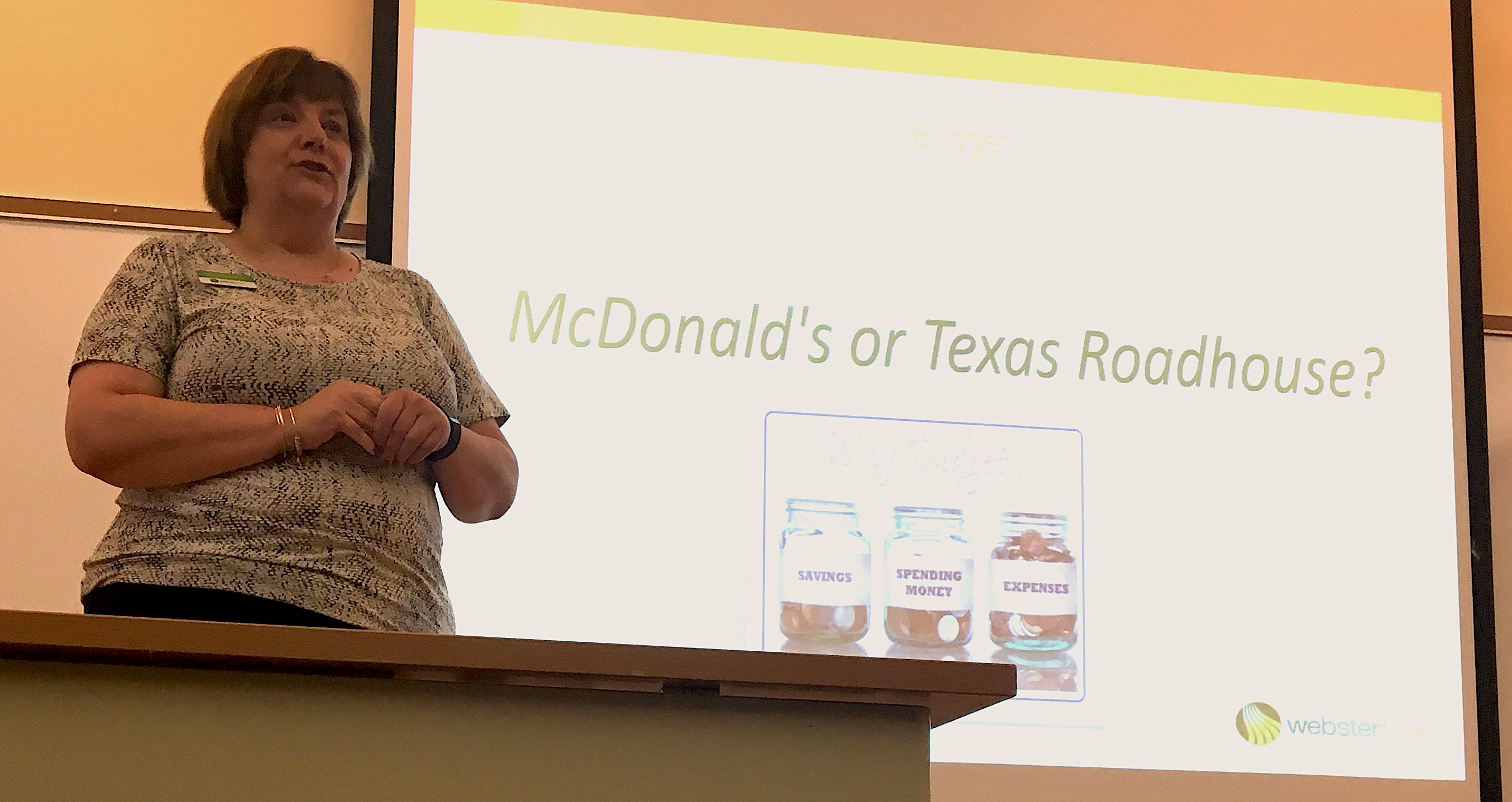BY ASHLEY DALLAIRE ‘18
Nichols College’s Professional Development Seminar program hosted two financial literacy workshops Sept. 27 in Davis Hall.
Seniors were required to attend one of the workshops.
Nancy Bouchard, AVP/senior branch manager at Webster Five Bank, lead the workshops, whose purpose was to get students started on the right foot after graduation. Bouchard discussed four areas of concern with respect to financial literacy: how to choose a bank, which account to choose, how to budget, and how to deal with frauds and scams.
Bouchard has 30 years of experience in personal finances and is a Nichols College alumna. Not only did she get her master’s degree in 2006 from Nichols, but also her son is a sophomore at Nichols. When she isn’t helping others with their finances, Bouchard is a volunteer at Dudley Middle School, where she teaches a financial literacy class to kids.
Whether it’s choosing a bank or the appropriate account, Bouchard explained to Nichols seniors that the bottom line is to determine what the bank is going to do for you. When it comes to deciding which bank to trust, bigger isn’t always better, according to Bouchard. Smaller banks can be more personal, she said.
McDonald’s or Texas Roadhouse? This was the title of her budgeting slide which was very intriguing. As she read this curious line, Bouchard explained that budgeting how you are going to pay off your debt and other expenses is similar to deciding whether you are going to eat at McDonald’s or Texas Roadhouse.
For example, you have to pay your car loan and apartment rent, and send a check to your mom for the phone bill this week. The waitress job you have pays $9 an hour plus tips, but this week you are only working four shifts.
Where can you afford to eat? McDonald’s or Texas Roadhouse?
Given these circumstances, you would probably eat at McDonald’s since your priority this week is to pay your bills. Maybe next week, once you are working more and have paid off the bills, you’ll be able to afford to eat at Texas Roadhouse.
To that end, budgeting is all about planning ahead.
Bouchard also emphasized the importance of your credit score. If you have a credit score of 700 or higher, you are showing the banks and potential investors that you are a good risk and can handle debt.
“Think about your GPA,” she told the seniors. “If you get all A’s the first semester but then goof off the second semester, it takes forever to get your GPA up. Unfortunately, it takes nothing to bring your GPA down but everything to bring it back up. This is the same in terms of your credit score.”
Bouchard’s analogy gave the students raised questions from the audience.
One student asked, “If you close a credit card, does that hurt your credit score?”
Another student asked,” Does it hurt your credit score if you check it?”
Bouchard said that depending on how many cards you have and whether you pay off your credit card could determine if closing a credit card could hurt your credit score. But in terms of checking your credit score, it does not bring it down. In fact, most companies give you a FICO credit score that provides a free estimate of what your credit score is.
I went a little further in asking her for her advice on what the best way to build up one’s credit score. To that Nancy responded: “You do not need multiple credit cards. Get one card then pay it off in full.”
Being a mother of a college student, she suggested to use Discover Card, as they are the most user- and student-friendly card. She also advised students to do their homework to find out what works best for them.
The last topic Bouchard discussed before opening the floor for questions was about fraud and scams.
“If it is too good to be true, stop and think twice,” she said.
Following the end of her presentation, I asked Bouchard what she thought students should do after graduation in terms of managing their debt. She said they should live at home if they can, to pay off the debt.
Ashley Dallaire is a Nichols College senior majoring in marketing. She interns for the College’s Office of Marketing and Communications.
